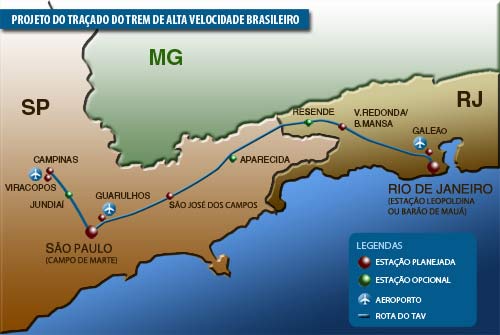RIO DE JANEIRO, BRAZIL – The construction and operation of a high-speed train between Rio de Janeiro and São Paulo, Brazil’s two largest cities, is no longer a public priority, but the government is ready to put the project in private hands, Infrastructure Minister Marcelo Sampaio said Thursday.
“The project is ready to be developed by the private sector if a company expresses interest,” the minister said at a virtual press conference to foreign correspondents in Brazil.
Sampaio said the government had discussed the ambitious project for about 15 years, and a public company was even created to develop it. Still, it was eventually discarded due to the high cost, lack of resources, and the need to invest in other sectors.
“The government is willing to allow the private sector to build and operate the high-speed train if it is interesting and finds it profitable. It is a project that offers a great opportunity that the private sector can exploit,” he added about a project in which Spanish, French and German companies have already expressed interest on several occasions.
The minister explained that the transfer of this project to the private sector is possible thanks to the new railroad authorization law that came into force last year, which allows the government to grant permits for the construction and operation of railroads to private companies that apply for them, without the need for tenders.
Since the law was approved by President Jair Bolsonaro last December, the government has already signed 27 contracts for the construction of 9,923 kilometers of railroads with an expected private investment of R$133.2 billion reais (US$26.64 billion).
In addition to the permits already granted, the National Land Transport Authority is considering another 50 applications from private companies interested in building railroads in different country regions, mainly for freight transport.
The project to connect the country’s two largest cities with a high-speed train was initially announced in 2007 and was part of the government’s plans to host the 2014 World Cup in Brazil.
An initial tender for the work in 2011 was declared invalid for lack of bids, after which the project was included in the transportation plans for the 2016 Olympic Games in Rio de Janeiro.
The following two tenders also failed, and a fourth and final tender was attempted in mid-2013 but was again canceled after only one bid was received, despite interest from several countries.
The government’s original project was estimated to cost around US$17.2 billion and involved the construction of a 511-kilometer rail line between Rio and São Paulo, from which a second 97-kilometer section would run to neighboring Campinas.
However, the project is considered highly complex, involving the construction of 90.9 kilometers of tunnels and another 107.8 kilometers of bridges and viaducts to cross rivers and slopes in a mountainous region.
Another project that could benefit from the new rail authorization law, according to Sampaio, is the proposal to build an inter-oceanic corridor in South America to connect Brazilian ports on the Atlantic with Chilean ports on the Pacific, in which Chinese companies are interested.
“It’s an exciting project that will be a priority in the coming years. A railroad can be built in Brazil to connect existing roads that complete the interoceanic corridor,” he said.
“Global demand for food is trending upward, and we are only producing half of our capacity. The Pacific Gateway will make our products very competitive,” he added.
With information from EFE


